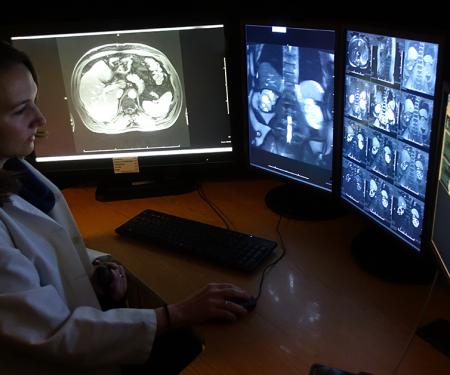Be an Informed Patient
It is important to fully understand the potential benefits, side effects and goals of radiation therapy. At Fox Chase, your radiation therappy team is available to answer any questions you may have during treatment. They are the best source of accurate information about your particular case.
Frequently Asked Questions
Coping with a diagnosis of cancer and researching the various treatment options can be a stressful experience. To assist you in this process, below is a list of questions you may want to ask your radiation oncologist if you are considering radiation therapy.
Q: What is radiation therapy?
Radiation therapy uses various forms of radiation to safely and effectively cure cancer, control the cancer’s growth, or to relieve symptos, such as pain. Forms of radiation include high-energy X-rays, electron beams, or radioactive isotopes to kill cancer cells while limiting radiation to nearby normal tissues.
Radiation therapy works by damaging the cancer DNA within the tumor and destroying the ability of the cancer cells to reproduce. When these damaged cells die, the body naturally eliminates them. Normal cells are also affected by radiation, but they are able to repair themselves in a way that cancer cells cannot.
The key to successful treatment is using the highest doses of radiation to kill the cancer while sparing the surrounding healthy tissue.
Radiation may be delivered through a machine called a linear accelerator externally (from outside the body). Radiation can also be delivered internally through radioactive materials placed inside the body near the cancer cells. The radiation is implanted using needles, seeds, wires, or catheters. This method is referred to as internal radiation therapy, implants or brachytherapy. Systemic radiation therapy, or radiotherapy, is another method of delivering radiation, such as a radiolabeled monoclonal antibody, that circulates throughout the body.
Radiation therapy is a commonly used treatment method—more than half of all patients who are diagnosed with cancer undergo radiation therapy as part of their treatment.
Q: Will I receive other treatments?
A: Cancer patients often receive other treatments such as chemotherapy, hormone therapy or surgery before or after radiation therapy. To ensure the best possible outcome, this multi-specialty approach means the doctors on your teamwork together. During your first visit you will meet with your radiation oncologist and a nurse practitioner. Your radiation oncologist may consult with your other doctors before your treatment begins to determine the best course of action. Other members of our support team may also be involved in your treatment.
Q: Who delivers radiation therapy?
A: A team of highly trained medical professionals work together to make sure you receive the best care possible. A radiation oncologist, a doctor who specializes in using radiation to treat cancer, leads this team.
Fox Chase Cancer Center's team of nationally-recognized, specially trained radiation oncologists are skilled in both standard and emerging radiation therapies. They actively participate in clinical trials to bring the most advanced care to our patients before it is available elsewhere.
Your doctor will explain the various therapies available to treat your type of cancer. You may receive radiation treatment alone or in combination with other cancer therapies such as chemotherapy or surgery.
When selecting a radiation oncologist, patients should consider the physician's experience with their specific condition.
At Fox Chase, each of our highly trained radiation oncologists specializes in treating just a few types of cancer, allowing them to become experts in the delivery of care.
This focus lets Fox Chase doctors to tailor treatment plans for each patient that can offer the best outcome possible.
In addition to providing leading edge technology and treatment to patients, our radiation oncologists are committed to research and education that advances the effectiveness of cancer treatment.
Q: What type of equipment is used?
A: Fox Chase offers patients access to the most sophisticated radiation treatment technology in the country, as well as the physicians with extensive experience using these tools. With the best equipment at their fingertips, they can develop a customized treatment plan for each patient, based on his or her specific needs.
Our physicians have developed advanced computerized applications to improve treatment planning methods, including three-dimensional computer software that helps doctors accurately target tumors, three-dimensional dose calculations, and methods for improving verification of radiation portals.
For more information or to schedule an appointment, call 888-369-2427.

